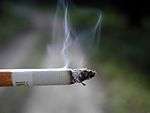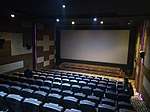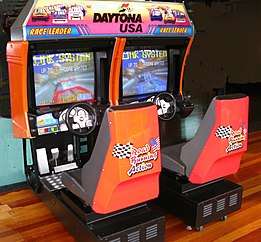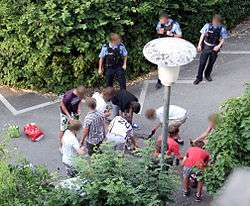Protection of Young Persons Act (Germany)
The Protection of Young Persons Act (German: Jugendschutzgesetz or JuSchG) is a federal law in Germany to enforce youth protection in public spaces and regulate media consumption by minors. The act does not apply to minors who are married.[4]
| JuSchG | |
|---|---|
.png) The Protection of Young Persons Act (2009) | |
Long title
| |
| Territorial extent | |
| Enacted by | |
| Passed | December 4, 1951[1] |
| Enacted | January 6, 1952 |
| Legislative history | |
| Bill | |
| Bill citation | Protection of Young Persons Act (Jugendschutzgesetz - JuSchG) [Unofficial English translation] |
| Amended by | |
| Amendment by Article 7, Sub-Clause 2, Act of December 27, 2003 [BGBl. I p. 3007], Amendment by Article 3, Act of December 29, 2003 [BGBl. I p. 3076], Amendment by Article 2, Act of July 23, 2004 [BGBl. I p. 1857, 2600], Amendment by Article 2, Act of February 27, 2007 [BGBl. I p. 179, 251], Amendment by Article 3, Act of July 20, 2007 [BGBl. I, p. 1595], Amendment by Act of June 24, 2008 [BGBl. I, p. 1075], Amendment by Article 3, Act of October 31, 2008 [BGBl. I, p. 2149], Amendment by Article 1, Act of March 3, 2016 (BGBl. I p. 369), Amendment by Article 11, Act of March 10, 2017 (BGBl. I p. 420) | |
| Keywords | |
| Legal drinking age, Alcohol laws, Alcohol laws in Germany, Legal smoking age, Youth Rights | |
| Status: In force | |
History
General history
On December 4, 1951 the "Law for the Protection of Minors in Public" (Gesetz zum Schutze der Jugend in der Öffentlichkeit (JÖSchG)) was enacted and came into force on January 6, 1952[1] in West Germany. The law was revised and re-enacted multiple times until in 2003 the law as well as the former "Gesetz über die Verbreitung jugendgefährdender Schriften und Medieninhalte (GjSM)" were merged into the newly legislated "Jugendschutzgesetz (JuschG)" which came into force along with the "Jugendmedienschutz-Staatsvertrag"[5] in the federal states of Germany.
A forerunner of the law was the "Lichtspielgesetz" from 1920,[6] which restricted the publication of movies in cinemas without former approval and review by a central commission. During the Nazi regime in Nazi Germany, the highly controversial "Polizeiverordnung zum Schutze der Jugend" (Police Ordinance for the Protection of the Youth)[2] came into force, which introduced punishment for the minor as well as the responsible adult failing to follow the regulation of the law.(RGBl. I S. 349).[7] This law was in effect until the newly formed Federal Republic of Germany enacted the new "Law for the Protection of Minors in Public" in 1951.[8]
Recent changes
- Amendment 1 September 2007: by passing the "Gesetz zum Schutz vor den Gefahren des Passivrauchens"[9] (Act for the prevention of danger by passive smoking) on 20 July 2007 § 28 Sec. 1 Nr. 12 and § 10 Sec. 1 JuSchG where amended. From now on the sale, distribution and supply of tobacco products is prohibited to all children and young people under the age of 18 years. Prior to the amendment the minimum age to purchase, possess and to be permitted to smoke in public was 16 years of age.[10] The operators of cigarette vending machines had time until 1 January 2009 to adjust (by adding an ID/Debitcard scanner to check the buyers age)[11] or remove their machines to ensure that cigarettes and tobacco products could not be bought by minors.
- Amendement 1 July 2008: coming into force on 1 July 2008 a "Killergame" ban was introduced meaning that from now on media that display "besonders realistische, grausame und reißerische Darstellungen selbstzweckbehafteter Gewalt beinhalten, die das Geschehen beherrschen" (especially realistic, gruesome and luridly depictions of self-inflicted violence which dominates the occurrence) are automatically considered as heavily harmful for minors which results in a general ban to advertise the video game, movie or other form of media and sales are solely restricted to under the counter sales for adults. Additionally the "BPjM" was given power to put games, movies or other type of media onto the index if they:[12]
- display self-inflicted murder or slaughter scenes or
- display Frontier justice as the only way to enforce the alleged justice
- Amendment 1 January 2009: the restrictions for cigarette vending machines (see above) come into force.
- Amendment 3 March 2016: by passing the "Gesetz zum Schutz von Kindern und Jugendlichen vor den Gefahren des Konsums von elektronischen Zigaretten und elektronischen Shishas" (Act for the prevention of Children and Young People from the dangers of consuming electronic cigarettes and electronic hookahs) § 10 JuSchG was changed resulting in a ban of sales of e-cigarettes, e-hookahs as well as their catridged (with and without nicotine) to children and young people under the age of 18 years. This amendment came into force on 1 April 2016.[13]
Summary
The Protection of Young Persons Act regulates:
- how long a minor may stay at specific public spaces such as
- bars and restaurants
- clubs/discotheques
- public spaces, events or establishments which are considered harmful for the youth
- gambling establishments
- the minimum age to sell to and permit minors to consume alcohol in public.
- the minimum age to sell to and permit minors to consume tobacco products and electronic cigarettes im public.
- the age restrictions for games and movies which have to be enforced by cinemas, public/private broadcasters and stores selling movies and video games.
- responsibility of the Freiwillige Selbstkontrolle der Filmwirtschaft (FSK) and the Unterhaltungssoftware Selbstkontrolle (USK) to issue age ratings for movies and video games.
- responsibility of the Bundesprüfstelle für jugendgefährdende Medien (Federal Department for Media Harmful to Young Persons) to index games, movies or other type of media and restrict sale and distribution. Also to enforce a general advertising ban for media which are considered liable to have an undesirable influence on the moral development of young people, especially media depicting glorification of war, displaying human beings in a way that violates their dignity as well as depiction of children or juveniles in an erotic or sexual manner.
Table summary
| Legal Source | Image | Description | Age limits | ||
|---|---|---|---|---|---|
| <14 years | <16 years | <18 years | |||
| ( Licensed premises |
 |
Remaining in restaurant or bar | Restricted1,2 | Yes (until 12 p.m)2 | |
Remaining in restaurants or bars
|
Yes (Unrestricted) | ||||
| Nightclubs and similar establishments | No | ||||
| ( Discotheques |
.jpg) |
Remaining at a discotheques or dancing events | Restricted2 | Yes (until 12 p.m) | |
Remaining at a discotheques or dancing events
|
Yes (until 10 p.m) | Yes (until 12 p.m) | |||
| ( Gambling |
 |
Remaining in a gambling establishment and participating in gambling | No | ||
| ( Events or premises of undesirable impact on young people |
Remaining at events or premises with undesirable impact on young people | No | |||
| ( Places with undesirable impact on young people |
Remaining at places with undesirable impact on young people | No | |||
| ( Alcoholic beverages |
Selling, furnishing or permitting consumption of spirits and food products containing spirits above negligible amounts | No | |||
| Selling, furnishing or permitting consumption of beer, wine, wine-like beverages or sparkling wine or mixtures of beer, wine, wine-like beverages or sparkling wine and soft drinks | No | Restricted3 | Yes | ||
| ( Tobacco products and e-cigarettes |
 |
Selling, furnishing or permitting consumption of tobacco products or e-cigarettes and catridges (with and without nicotine) | No | ||
| ( Movies |
 |
Visiting the cinema | Yes (until 8 p.m)2,4 | Yes (until 10 p.m)2,4 | Yes (until 12 p.m)2,4 |
| ( Computergames and movies |
Selling or furnishing computergames and movies | Yes4 | |||
| ( Arcades |
 |
Using electronic arcade machines | Yes4 | ||
1 Unaccompanied children <16 years only permitted in a restaurant or licensed premises during the time of 5 a.m until 11 p.m. to consume a meal or a have a non alcoholic beverage.
2 No restrictions if accompanied by a parent or legal guardian.
3 The consumption of beer, wine, wine-like beverages or sparkling wine or mixtures of beer, wine, wine-like beverages or sparkling wine and soft drinks in public is generally permitted for minors aged 16 years or older. However, if the minor is accompanied by his parent or legal guardian the age limit the consume such beverages drops down to 14 years.
4 If specific age-limit for movies/games/arcades are followed.
Enforcement

Contrary to the former "Polizeiverordnung zum Schutze der Jugend" the "Jugendschutzgesetz" does not penalize children and young people but rather the responsible adult failing to enforce the provisions of the law. All licensed premises and operators of events have to place a clearly legible copy of the act at the premises or place of event.[14]
Making media which is indexed for being considered "harmful to young persons" accessible to minors as well as violating further provisions which are set out in § 15, 21 and 28 JuSchG can be prosecuted by imprisonment up to one year or a fine.
Violations in context of protection of young persons in the public are considered a misdemeanor/regulatory offence which can be fined up to €50,000.[15]
Gambling in casinos
Gambling in a licensed casino (Spielbank) is additionally to the general prohibition for minors to participate in gambling by the Protection of Young Persons Act, prohibited by state law in all German states. The age limit varies with 14 out of 16 states requiering a minimum age of 18 years to participate in gambling and enter a licensed casino.[16] However Bavaria and Baden-Württemberg are the only two states that require a minimum age of 21 years.[17][18]
Aspects which are not covered by the law
- The age restrictions for the sale and furnishment of fireworks and other pyrotechnical items is not covered by the Protection of Young Persons Act but rather by the Verordnung zum Sprengstoffgesetz (Ordinance for the Explosives Act)[19]
- Contrary to popular believe the Protection of Young Persons Act does not include a general juvenile curfew but rather restricts minors from entering or mainting at certain establishments or location which are open to the public (such as bars, discotheques, brothels and night clubs). How long a minor is permitted to stay in public (besides mentioned establishments) is generally upon the parents decision.[20]
- Even though all sales of tobacco products are prohibited to minors since 1 September 2007 the sale of smoking accessories such as bongs, hookahs, cigarette papers, lighters, pipes or herb grinders is not regulated, and thus sale is permitted to minors. However, in Bavaria the sale of lighters is prohibited to children under the age of 12 years.[21] Additionally many retailers such as Rewe or Edeka have own guidelines that restrict the sale of smoking accessoires to children under 16 or 18 years of age.[22][23]
Notes
- Gesetz zum Schutz der Jugend in der Öffentlichkeit – BGB 1951 I p. 936, Bundesanzeiger Verlag GmbH, retrieved 2019-06-05
- Polizeiverordnung zum Schutze der Jugend (1934) (PDF), Der Reichsminister des Innern, retrieved 2019-06-05
- Jugendschutzgesetz (JuSchG) – BGB 2003 I S. 476 (PDF), Bundesanzeiger GmbH, retrieved 2019-06-05
- Jugendschutzgesetz (JuSchG) - § 1, Bundeministerium für Justiz und Verbraucherschutz, retrieved 2019-06-12
- Staatsvertrag über den Schutz der Menschenwürde und den Jugendschutz in Rundfunk und Telemedien (Jugendmedienschutz-Staatsvertrag – JMStV) in der Fassung des Neunzehnten Staatsvertrages zur Änderung rundfunkrechtlicher Staatsverträge (Neunzehnter Rundfunkänderungsstaatsvertrag) (PDF), Kommission für Jugendmedienschutz, retrieved 2019-06-05
- Lichtspielgesetz 1920, documentArchiv.de, retrieved 2019-06-05
- Neufassung der Polizeiverordnung zum Schutze der Jugend vom 9. März 1940 (RGBl. I S. 499); Geltung ab 23. März 1940.
- Bruno W. Nikles: Immer komplexer: Die Entwicklung der rechtlichen Regelungen zum Jugendschutz. In: Kind, Jugend, Gesellschaft. Zeitschrift für Jugendschutz. Heft 4, 2002, S. 119–125. (PDF; 130 kB).
- Gesetz zum Schutz vor den Gefahren des Passivrauchens – BGBl. I p. 1595 (PDF), Bundesanzeiger GmbH, retrieved 2019-06-05
- Nichtraucherschutz: Zigarettenkauf erst ab 18, Handelsblatt, retrieved 2019-06-05
- Alterskontrolle an Zigarettenautomaten, rauch-frei.info, retrieved 2019-06-05
- Bundestag verabschiedet Jugendschutzgesetz gegen "Killerspiele", heise.de, retrieved 2019-06-05
- Rauchverbot für Minderjährige – Auch E-Zigaretten und E-Shishas erfasst, Bundesministerium für Familie, Senioren, Frauen und Jugend, retrieved 2019-06-05
- Jugendschutzgesetz (JuSchG) - § 3, Bundeministerium für Justiz und Verbraucherschutz, retrieved 2019-06-12
- Das Jugendschutzgesetz: Kann ein Bußgeld verhängt werden?, VFR Verlag für Rechtsjournalismus GmbH, retrieved 2019-06-12
- Casinos in Deutschland: Spielbanken Liste, Öffnungszeiten & Altersbeschränkung, casinoonline.de, retrieved 2019-06-05
- Landesglücksspielgesetz (LGlüG) – § 29 Teilnahme am Glücksspiel (1) (PDF), isa-guide.de, retrieved 2019-06-05
- Spielbankordnung (SpielbO) – § 3 Teilnahme am Glücksspiel (PDF), isa-guide.de, retrieved 2019-06-05
- Erste Verordnung zum Sprengstoffgesetz (1. SprengV) – § 20, Bundesministerium für Justiz und Verbraucherschutz, retrieved 2019-06-05
- Ausgehzeiten – Wie lange dürfen Kinder und Jugendliche abends wegbleiben?, elternimnetz.de, retrieved 2019-06-05
- Feuerungsverordnung (FeuV) – § 6 (1), Bayerische Staatskanzlei, retrieved 2019-06-05
- REWE verstärkt Jugendschutz beim Alkoholverkauf, Presseportal, retrieved 2019-06-05
- Ab wann darf man eigentlich Feuerzeuge kaufen?, Hr. Mayr (for feuerzeug-guide.de), retrieved 2019-06-05